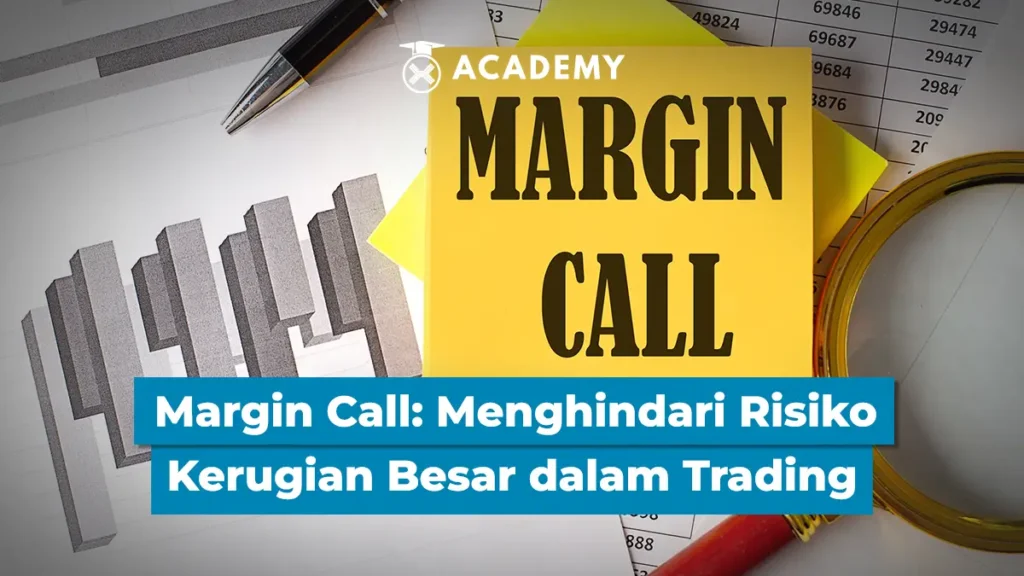In the world of trading and investment, margin call is a term that often causes concern for market players.
A margin call itself occurs when the value of a trader’s margin account falls below the minimum limit set by the broker, forcing the trader to deposit additional funds or close positions to meet margin requirements.
Understanding margin calls is essential so that traders can manage risk well and avoid greater losses. Without adequate understanding, margin calls can be the starting point for major losses that are difficult to recover.
The relevance of margin calls is not limited to one market, but includes various instruments such as forex, stocks, and cryptocurrencies.
Basically, each market has unique characteristics that affect how margin calls can occur, making this understanding even more important for traders in the modern financial era.
What is a Margin Call?

A margin call is a request from a broker to an investor to add funds to a margin account in order to meet minimum capital requirements.
It occurs when the percentage of an investor’s equity in the margin account falls below a minimum amount set by the broker. An investor’s margin account contains securities purchased with a combination of the investor’s own funds and funds borrowed from the broker.
A margin call specifically refers to a demand from a broker that an investor deposit additional funds or securities into their account.
In doing so, the investor’s equity and the value of the account may increase in accordance with the minimum value set by the maintenance requirements.
Typically, a margin call is an indicator that the value of the securities held in a margin account has decreased.
When a margin call occurs, the investor must decide whether to add funds or securities that can be used as collateral to the account or choose to sell some of the assets in the account.
Margin Call Types
The following are the types of margin calls that are important for investors to understand in order to properly manage their margin accounts and avoid potential forced liquidation.
1. Maintenance Margin Call
This is a request from the broker for investors to meet maintenance margin requirements. Maintenance margin refers to the minimum amount of equity that must be in a margin account to meet the broker’s requirements.
If the account value falls below this limit, the broker will request additional funds or securities to meet these requirements.
2. Regulation T Margin Call
This request relates to the initial margin requirements, as regulated by Regulation T issued by the Federal Reserve (The Fed) in the United States.
Quoting the corporatefinanceinstitute.com page, Regulation T issued by the Federal Reserve sets a minimum maintenance margin limit of 25% of the total investment.
However, some brokers may set a higher maintenance margin percentage, such as 30% or even 40%, depending on the policies of each broker.
This rule is implemented by brokers to protect themselves from the risk of default by customers. With this provision, the broker ensures that the customer’s margin account has sufficient collateral to cover potential losses.
Causes of Margin Calls
Margin calls usually occur due to careless margin account management or unfavorable market conditions. Here are some of the main factors that can trigger a margin call.
1. Decrease in Asset Prices
When the market value of assets held in a margin account falls, the investor’s equity also decreases, which can trigger a margin call if the equity falls below the maintenance margin requirement.
2. Excessive Leverage
Leverage helps investors manage positions larger than their capital. However, excessive leverage increases the risk of a margin call when the market moves against their position.
3. Market Volatility
Sharp price fluctuations during periods of high volatility can quickly reduce the value of a margin account, increasing the chances of a margin call.
4. Lack of Effective Risk Management
A lack of risk management strategies, such as not using stop-losses or not calculating a safe leverage ratio, will make a margin account more vulnerable to margin calls.
Stages of Margin Call
Basically, a margin call is a process that occurs gradually due to a decrease in the equity value in a margin account. The following are the main steps that illustrate how a margin call can occur.
1. Decrease in Equity Value
A margin call begins when the equity value in a margin account decreases due to adverse market movements, such as a decrease in the price of an asset owned. This causes the equity to fall below the maintenance margin requirement.
2. Request for Additional Funds by Broker
When the equity value falls below the minimum limit, the broker will issue a margin call as a protective measure. The broker will also ask the investor to add funds or securities to the margin account to meet the maintenance requirements.
3. Automatic Position Closing
If the investor does not meet the margin call within the specified time, the broker can automatically close the existing position. This step aims to protect the broker from potential further losses.
Impact of Margin Call
A margin call can have a significant impact on investors, both in terms of finances and control over investments. Here are some of the main consequences that can occur due to a margin call.
1. Large Financial Losses
Margin calls can cause large losses because investors are forced to add funds or securities to meet the margin or they must sell assets at a loss.
2. Automatic Position Closing
If investors do not meet the margin call, the broker can automatically close the position, locking in losses and eliminating the opportunity to improve the situation.
3. Loss of Control over Invested Assets
In the case of a margin call, investors lose control over their investment decisions because their positions can be closed without further approval.
4. Risk of Losing Potentially Profitable Assets in the Future
The closing of positions triggered by a margin call can also eliminate potential future profits if the market reverses and the assets sold then increase in value.
How to Avoid Margin Call

To reduce the risk of margin calls, investors need to implement a careful strategy in their investment management. Here are some steps that can be taken to avoid margin calls.
1. Good Risk Management
Determine the position size according to the account balance and avoid excessive use of leverage. This will help reduce the risk of losses that can trigger a margin call.
2. Use of Stop Loss
Place a stop loss order at a strategic level to limit potential losses. This will help protect the margin account from adverse market movements.
3. Portfolio Diversification
Spread investments across various assets to reduce risk. Diversification can reduce the negative impact if one asset experiences a significant decline in value.
4. Actively Monitor Positions
Always monitor market conditions and account positions regularly to take quick action if there is a significant market change.
Margin Calls in Different Markets
It is important to note that margin calls apply in different types of markets in slightly different ways, depending on the instrument being traded.
Each market, such as forex, stocks, and crypto markets, has mechanisms and regulations that govern margin calls to protect investors and maintain market stability. Here is an explanation of how margin calls are applied in each market.
1. Forex
Margin calls are especially relevant for forex traders, given the rapid and frequent price fluctuations. Forex brokers manage margin calls by setting a minimum margin level, ensuring that traders have sufficient funds to cover their positions.
When the equity in a trader’s account falls below this level, the broker will request additional funds or automatically close the position.
2. Stock Market
In the stock market, Regulation T regulates the initial margin requirements that must be met by investors when buying stocks on margin.
If the investor’s account equity falls below the minimum limit, the broker will issue a margin call.
This also forces investors to add funds or securities to their accounts. This also applies in the case of a significant drop in stock prices.
3. Crypto
Margin trading in the crypto market is very vulnerable to high volatility. Therefore, margin calls serve to protect the crypto ecosystem by ensuring that traders do not risk losing more than they invest.
Usually, crypto brokers set certain margin limits and if the account value drops too low, they will close the position or request additional funds to prevent greater losses.
Regulation and Role of Brokers
Each market basically has different margin call regulations, which aim to protect investors and maintain market stability.
In the forex market, for example, margin rules are often more flexible than in the stock market which is more strictly regulated by institutions such as the SEC and FINRA.
As for the crypto market, margin call regulations are still developing and can vary, depending on the trading platform used.
On the other hand, brokers play an important role in managing margin calls to protect both parties, both themselves and traders.
They must ensure that the funds in the margin account are sufficient to cover potential losses and they can automatically close positions if there is a sharp decline in value.
Not only that, brokers are also required to ensure that traders understand the risks associated with using margins and provide limits according to the trader’s capabilities.
Basically, each broker has a margin policy that can vary. Some brokers may offer high leverage with looser margin calls.
Meanwhile, some other brokers will be more conservative in offering leverage and have tighter margin calls. Usually, this is influenced by local regulations and the broker’s internal policies regarding risk management.
Conclusion
Well, that was an interesting discussion about Margin Call: Definition, Stages, and Strategies to Avoid It that you can read in full at the Crypto Academy at INDODAX Academy.
In conclusion, understanding margin calls is very important for every trader and investor because it can prevent major losses caused by unexpected market fluctuations.
Margin calls can also have significant impacts, such as major financial losses, automatic position closures, and loss of control over invested assets.
Therefore, it is important to implement effective risk management strategies, such as wise use of leverage, portfolio diversification, and active position monitoring, to minimize risk and protect investments.
FAQ
1. What is a margin call?
A margin call is a request from a broker to a trader to add funds to a margin account or close a position if the balance is insufficient.
2. Why does a margin call occur?
A margin call occurs when the account equity value falls below the minimum margin requirement, usually due to major losses or the use of high leverage.
3. What is the impact of a margin call?
The impacts include automatic position closure by the broker, financial losses, and loss of control over invested assets.
4. How to avoid margin calls?
Use good risk management, stop losses to limit losses, avoid excessive leverage, and monitor your account regularly.
5. What is meant by margin call level?
Margin call level is a certain level at which your account equity reaches the minimum limit that triggers a margin call request from the broker.





 Polkadot 8.91%
Polkadot 8.91%
 BNB 0.54%
BNB 0.54%
 Solana 4.81%
Solana 4.81%
 Ethereum 2.37%
Ethereum 2.37%
 Cardano 1.35%
Cardano 1.35%
 Polygon Ecosystem Token 2.11%
Polygon Ecosystem Token 2.11%
 Tron 2.85%
Tron 2.85%
 Market
Market


